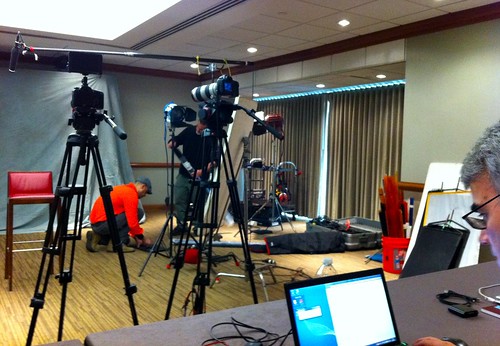A long time ago, when the world was young, I did a research project towards my Biochemistry Part II exam. Three months in a lab, learning how to do cell culture, how not to kill myself with iodine-125, and making hundreds of very pretty immunofluorescence photographs. It was a nice little project, and I got some publishable results. So publishable in fact, that when the head of department said he’d be able to find me some money to come and work in the lab over summer—after my exams and before I started my DPhil—I leapt at the chance.
That story, and of how he didn’t pay me for that summer, and how he muscled in on the author list and conspired with my supervisor to push me off the coveted first author position, are for another day. What concerns me now is that I didn’t write the paper. Naturally—I was studying for exams, about to go and work for someone else, and thought it entirely natural that my supervisor (with so much more paper-writing experience than me) should write up my results. Of course I read it, of course I commented—I may even have written up some of the methods—but there’s no way I could be said to have written that paper.
Similarly, even when I was the lead author, having done the intellectual lifting and most of the lab work, I didn’t write my next couple of papers (it could be argued that I was under the anally retentive thumb of certain lab heads, but I couldn’t possibly comment). In fact, my name has appeared on a couple of papers where I wasn’t even in the same lab.
Shocking?
Well, Martin Raff once described the way I was screwed over by that head of department and supervisor as ‘shocking’, but the fact that I didn’t write papers with my name on them isn’t abnormal, is it? In fact, I’ve seen papers in PubMed where it would have been impossible for all the authors to say they had ‘written’ the paper. You know the ones I mean: generally genetics or physics papers with over a hundred co-authors. In those cases it is highly unlikely that the person who actually wrote the paper did any lab work at all (and their intellectual contribution might not have been that great, either).
Equally, I have contributed to many papers where I have not been listed as an author. I have helped foreigners with their English, made comments on style and grammar; even suggested extra figures or experiments. Sometimes I’ve been acknowledged, sometimes I haven’t.
So why does everybody get upset when papers appear that are ‘written’ by someone who isn’t listed as an author?
Dr Vallance, of Ninewells Hospital, Dundee, wrote to Eye (published by NPG, by the way), saying that publication of a particular article (Preclinical aspects of anti-VEGF agents for the treatment of wet AMD: ranibizumab and bevacizumab) is “a matter for the Editor.” Why? Of the review article, Dr Vallance says, “My main concern is that the authors did not write it.” He adds, “The subject of ‘medical ghostwriting’ and the potential effects on healthcare delivery is a controversial area.”
There is a robust response from the credited authors of the article in question, accusing Dr Vallance of libel. There is an equally robust response from the medcomms agency that was tasked with the actual writing of the article.
Medical communications and publishing, and the pharmaceutical industry itself, are among the most heavily regulated industries on the planet. And writing of articles by people who do not appear in the authorship list goes on all the time—in an orderly and heavily regulated fashion.
Pharmaceutical companies fund a great deal of research, and they publish that research in peer-reviewed journals. They also publish the results of clinical trials (admittedly there is a problem with which results get published, but that’s a separate argument). When a study, pre-clinical or otherwise (or, as in this case, a review), is published as a peer-reviewed article then the financial involvement of that pharmaceutical company is disclosed—as are the financial interests of any and all of the authors under whose names the article appears. When anybody performs research, and wishes to publish the results of that research, why should they not retain the services of professional writers? Especially when they have big pharma to pay for those services? Each author takes responsibility for their contribution to the research and the manuscript as a whole (and please, do read the response by Meyer and Holz).
If the person who actually typed the words into Word in the first place happens to be a professional writer, and this contribution is acknowledged, then why is there a problem? Wouldn’t you rather see data published quickly, knowing that the brains behind the research are continuing to contribute to advancing healthcare? Or would you rather wade through execrable prose? Why is this any different from helping a colleague edit their manuscript? (Except that money changes hands. In which case there is a paper trail.)
This isn’t making up results, this isn’t cherry-picking data, this isn’t creating fake medical journals; this certainly isn’t writing about a drug and then putting top docs’ names to it.
Let’s turn this around slightly. If you, as an author, enlisted a colleague’s assistance in editing or writing your manuscript, and remunerated them in some way, would you put them as an author? Wouldn’t you rather acknowledge their help at the bottom of the manuscript? And you would even dare say they were, or how they were, remunerated?
Not to mention that if this practice was banned, all these highly skilled writers would be out of a job, and instead likely competing for the same grants you’re after.
Conflict of interest: rpg works in the med comms & publishing industry.








